|
Srdjan Spasojevic's A Serbian Film [Srpski film], without question the most controversial and divisive film of 2010, is not an easy one to write about in an even-handed or balanced manner. Those who react negatively to the extremity of its content run the risk of being labelled overly sensitive and of missing the subtextual point, while an allegorical reading exposes the writer to charges of pretentious gullibility. But in the case of A Serbian Film, a viscerally shocking, morally punishing work born from Spasojevic's anger at the exploitative nature of modern society and the darker aspects of his own country's recent history, both views are valid and deserve to be made and heard.
Reactions to the film have differed widely and will doubtless continue to do so, but such is the nature of extreme cinema. In an unusual but not unique move, we've elected to review the film from two perspectives, an approach that was not the result of forward planning but two very different responses to the same film. It's important to establish up front that they were written independently and neither is intended as a reaction to the other, and where there are alternative opinions on specific aspects then this is purely coincidental, not a reaction by one reviewer to the views of the other.
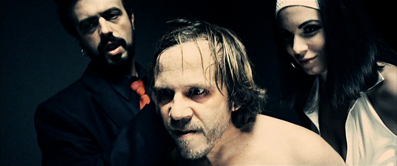
The two pieces appear in the order in which they were written. Camus wrote his at the end of December and described it to me as a reaction rather than a review, but it's a thoughtful and well argued one, particularly given the extremity of response in some more widely read quarters. My own reading focuses more on the thematic underbelly, as despite the film's effectiveness as a pitch-black horror drama (and the arguments over that will doubtless continue to rage), for me it only makes real sense when viewed in allegorical terms.
| Cockwork deranged |
| A muse on the many penetrations of A Serbian Film by Camus |
| |
|
| |
"I mean, things don't affect people the way they used to. It may very well be that ten years from now people will pay ten thousand dollars in cash to be castrated, just in order to be affected by something!" |
| |
André Gregory in the sublime My Dinner With André (1982) |
| |
"That's it Milos. That's the cinema!" |
| |
Vukmir, (Sergej Trifunovic), Mark E. De Sade's
director of choice in A Serbian Film |
André's "ten years from now," is now eighteen years ago. As far as I know it is still only a minority who derive pleasure (physical feeling, certainly) from having blades taken to genitalia but then we only hear about the reported cases. In the relevant scene in the latest cinematic bête noir, A Serbian Film, we are treated to (one assumes) an oversized penis held to a bizarre ransom. The blade makes a nick in its base while its owner, Milos, threatens to slice off what he sees as the cause of his unspeakable misfortune. It's also the thing held in much awe by his despicable and ghastly employer, Vukmir (what a character name that is. In Serbian it probably equates to a mundane 'Smith' or something equally less offensive). If the editor of the Daily Mail himself, Paul Dacre, had funded A Serbian Film in order to fill pages and pages of outrage in his desperately awful rag (the word newspaper referring to the Mail is singularly oxymoronic), he couldn't have been happier. If you want to induce moral panic in people whose opinions are inflamed as easily as Sergeant Howie, then A Serbian Film has everything and a little more too. Self-appointed, morality police chief of old, Mary Whitehouse, would probably have fainted at the first paragraph of the synopsis.
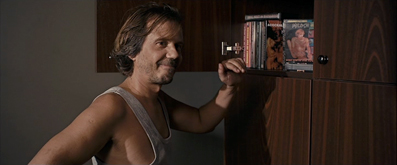
An ex-porn star, Milos, is hired to make progressively near the knuckle porn sequences for a fee that effectively promises retirement, paid by a director whose vision embraces (let's be charitable) the spectacularly and criminally obscene by anyone's standards. His puppet rebels but drugs control Milos enough to force him to finish the director's grand plan. Violence erupts. Happiness, seriously, does not ensue. In terms of ideas, almost everything in the movie would make ideal targets for a "Disgusted From Margate" Daily Mail reader's letter – it's how well those ideas are executed that's a large part of the furore (my assumption). There's no doubt in my mind that the direction is assured, the score, unnerving and all performances are wonderfully committed and staggeringly convincing. That's why it hurts so much. But then I imagine dear Mary, the late, patron saint of Dacre, clockwork-oranged into a chair, a pipette of brine regularly emptied into her drying eyeballs, subjected to this movie. I imagine the dear lady (whom I loathed with unquestionable teenage fury as a devotée of cinema in all forms) would have self-combusted with inflamed righteous zeal. If you'd shown me A Serbian Film as the teen I was, I may have been able to say "It's only a movie," but not comfortably. This changes the scope and remit of the word 'harrowing'.
And I'm trying to find reasons why anyone would actually enjoy the experience but then cinema has never slept well in such a narrow confine. Enjoyment is a thin sliver of what true cinema promises. This is, after all, why this site was set up. A Serbian Film is exactly the kind of work that this site should cover and I am already excited to read Slarek's upcoming DVD review considering my awkward position on the movie. My reasons for watching it were, to be honest, being very suspicious of the sheer weight of press outrage, a rampant curiosity, the Fright Fest debacle and let's not forget fear and principally being able to take the position that I had seen it and therefore could have a legitimate opinion. I won't be re-watching it for any subtext I missed first time around. First time around is enough. It just occurs to me that an anagram of subtext is 'butt sex'. I didn't miss that subtext, not one little bit.
A Serbian Film is every post-Whitehouser's dry dream. Single scenes, hell, single images, could fuel their moral indignation for eons. There are ideas and overtly graphic executions of ideas in here, which lay on the boundaries where entertainment, taste, allegory, philosophy, masochism, sadism and disgust all share a small table (no tapas as no one would trust where anyone else's fingers had been). And to think the idea of anal intercourse vis-à-vis Bertolucci's Last Tango In Paris and the mere suggestion of it in the movie (let's face it, hardcore that was not) caused a sensation in the 70s. A Serbian Film goes (strictly speaking 'comes') where no man has come before. If you think I'm being flippant given the appalling subject matter of sexual violence then yes, mea culpa. I find I cannot approach this film with anything like rational thought. I feel like I've been penetrated by a personified howling disgust, a creature that's also reading philosophy at Cambridge. And these sorts of images stay with you for a long time. I'm screwing my face up, lips drawn back while insanely curious about the filmmaker's intention. It's like watching a rat rot but still being drawn in by the process of putrefaction while having the rat poisoner whisper in your ear "It's symbolic...". It's car crash cinema, out-Cronenberging the Canadian horror maestro.
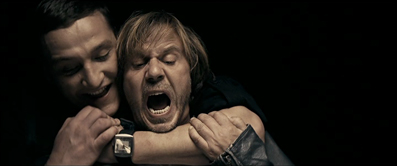
Supporters of what must be a ceiling smasher in terms of cinematic graphic imagery (in sub-mainstream terms – I'm certain there's much worse out there if you had the will to find it) may trot out the same 'metaphor-as-defence' gambit as the filmmakers do. The vague idea (from reading interviews rather than directly gleaned from the movie) is that these horrific events were regularly performed during wartime in Serbia. It's hard to fold in metaphor while watching the grisly and frankly horrible scenes offered up to us. If I could stroke my chin and think "I know where he's going with this..." I may be more sympathetic but frankly (and who couldn't be frank after watching this extraordinary film?) watching a newborn baby freshly delivered and then...(let's not even go there) doesn't conjure up a metaphor of anything. But then the clue is in the title. Or is that not the clue, just a post-horror/ exploitation stab at intellectual rationalization?
OK, deep breath. Call me creosote. Why? Because I'm so on the fence about A Serbian Film and it's not a comfortable place to be at all. I have started this article four times in an attempt to put my finger on what is a huge dilemma in my head. Can it be defended as a work of art or craft that prompts the audience to think about larger issues such as state control and the abuses of power or is it a debauched attempt to shock just for shock's sake? I cannot view it as a horror film – though it certainly is horrific. You never hide behind your hands. You need both of them to lift your jaw up off the floor. Srdjan Spasojevic's movie has become the latest entry in the "So what is this generation's Last Tango?" enabling certain factions of our 'big' society to get worked up into a lather. The subtext is always "You – 'the other' – need to be controlled and my version of what's right, shared by others, will wield that control." I'm a father of a 14 year old and I'm playing him Alien this evening after a big fuss from him to be allowed to watch it (in high definition). A part of me is excited about my son having a similar reaction to my own (I know, I know) and another part is mourning an innocence that I possessed way beyond 14. He saw it. Water. Duck etc. The hero of A Serbian Film has a devoted wife and son and they are abused beyond any imposed cinematic limit. I should be more offended demographically speaking. I should harrumph and bluster but there's that freedom of speech thing again.
When are we going to stand up and say "We are adult human beings who enjoy a freedom to chose what art to enjoy/experience and what art to avoid." Is it art? That's another subject. Is it defensible? Why would anyone want to defend it? It's a movie. It's not real. It. Is. Not. Real – however 'real' the events staged are in the experience of real people in real situations. The fact that the film features – in meta-graphic detail – some pretty mind bogglingly sick physical events – is not up for debate. It does and more. As I find myself demographically identical to the hero, I have that pre-Vukmir life so the idea of it being stripped from me by a man who could only have been born to Hieronymus Bosch's subconscious and a black widow spider is overwhelmingly repellant. The only way out for Milos and his family gives us a profoundly twisted and dark re-meaning of the word 'bleak'.
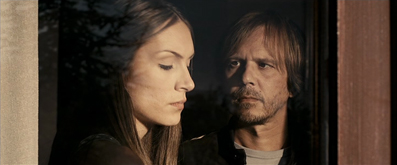
My English teacher once announced to a startled class of fourteen year-olds that "Sex was a violent act because its success relied upon penetration." Now whether this was his way of slyly engaging even the more disruptive elements of 4B, I don't know. But evolution and its subsequent biological answers, when everything's working properly, have solved that problem. But he (excuse me) had a point. Men have this in built stick that has sagged under the weight of allegory, symbolism, euphemism and machismo and the latest movie to exploit this allegorical negative penetration scenario is A Serbian Film. Without question, it has great power above and beyond its horrific imagery due to the skill of its filmmakers. Whether it succeeds as a metaphor for the country's descent into state sponsored control and violence is wholly dependant on how much slack you want to give director Spasojevic. Personally, I couldn't make it out. Anyway, I was too affected by the shock on offer. From the director's point of view, it's a little like expecting a person to notice the feel of their cashmere glove on your face as they're stabbing you in the eye. One event overpowers the other to an almost absurd degree. And that could not have come as any sort of surprise to the filmmakers, could it?
| Sticking it to the man |
| An appreciation of the dark underbelly of A Serbian Film by Slarek |
| |
|
| |
"The major metaphorical take was to treat real life as pornography. For the last few decades we've brought ourselves to the point where we experience our lives as pure exploitation, through which we are emotionally, psychologically and creatively raped by the incomprehensible, chaotic, stupid and brutal forces of corrupt authority. In order to lead a normal life you have to become a prostitute. You have to sell your soul and your ass to the highest bidder in the name of feeding your family. Violence comes out of that kind of everyday pornography as much as it is the other way round." |
| |
Director Srdjan Spasojevic |
It's nigh on impossible to make a confrontational and allegorical film without inviting the scorn of the unconvinced and accusations regarding the Emperor's transparent new wardrobe. So when director Srdjan Spasojevic states up front, as he does on this very DVD, that A Serbian Film was designed as a just such a work, a good many will scoff and accuse him instead of going out of his way to shock with the sole intention of riding to fame on the wave of the subsequent controversy. And who knows, maybe they're right. It is, after all, surprisingly easy to get creative with interpretation and read false meaning into just about anything you see.
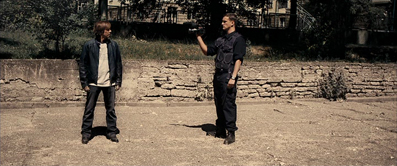
But half-an-hour into Spasojevic's morally dark and difficult A Serbian Film there occurs a moment whose allegorical nature struck me as impossible to ignore, one that is further developed in the sequence that follows. The moment in question occurs after Milos arrives at the location of his first day of filming on the porno art movie he has signed up to star in. The car he arrived in pulls away to leave him standing, awkward and motionless, being silently observed from by an equally static figure dressed in the uniform of the Special Police and holding a small HD camcorder. It's at this point that the easy naturalism of the preceding scenes switches to something more stylised and composed – the cameraman seems to appear from nowhere and there is almost the sense that Milos has not so much stepped out of the car as into an alternative reality. The real-world symbolism is almost blatant here – as an apprehensive Milos enters the seemingly deserted Home for Abandoned and Orphaned Children, the camera operator is joined by an identically dressed companion and the two become a pair of walking security cameras, representatives of the (police) state who record every movement of their targeted subject under the direction of a mysterious but powerful employer.*
With the current resurgence of warped belief in the goodness of greed, it's easy to warm to Spasojevic's above stated assertion that we effectively prostitute ourselves to make ends meet and prosper in modern society. It's a notion that slaps me squarely in the face every time I turn on the TV, as I wearily watch comedians who would once have employed their talents to challenge and attack the status quo now hawking everything from Direct Line Insurance to Crunchy Nut Clusters. These are the bejewelled concubines of corporate prostitution, those who whore themselves willingly for conglomerates in the pursuit of money they neither need nor deserve. For those on the lower rungs it's more a matter of survival than choice, and in a society that encourages self-interest at the expense of all but the immediate family, the majority are forced to dance to the employing corporation's tune. Increasingly we are badgered to buy not what we need but what we're told we should have. It's a collective cupidity that is now programmed into us almost from the moment we emerge from the womb, in the television images that now share in the role of child-rearing, in those kiddie-high sweet trays that supermarkets place by the checkouts, in the brand-name loyalty that helps us to select just the right make of baby food, nappies, vitamins and wet wipes. For a modern teenager, much of life is about commercial choices, about brands and labels and corporate identity, a proclaimed freedom of choice in which the product increasingly controls its owner.** And when you die then don't worry, because there's a good chance you'll still end up paying for your own funeral, and the fact that you have ceased to exist in mortal form will not prevent companies from phoning you up and trying to sell you life insurance.
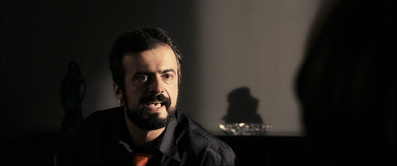
Spasojevic himself states in the introduction he provides on this DVD that "you are raped from birth and the raping doesn't stop even after your death," and it's in the cinematic expression of this viewpoint that the film is at his most allegorically literal, as Vukmir angrily (and revealingly) equates the country to "one big shitty kindergarten" and screens footage for Milos of a newborn baby being raped to the delighted smile of its watching mother. Nowhere is the film-as-metaphor more plainly visible – the baby is clearly a fake (at least in the uncut version), and the mother's reaction unlikely in any real world scenario, while the footage that so excites Vukmir ("This is a new genre Milos! Newborn porn!") is the point at which the services of the sickened Milos can no longer be bought at any commercial price. There's no doubt that Spasojevic is deliberately pushing outrage buttons here, but he is doing so in the knowledge that (and probably because) the real world situations he is allegorising fail to provoke the anger they by all rights should – we not only allow the representatives of government and the corporate world to butt-fuck us on a daily basis, we openly (or perhaps that should be blindly) embrace it. In this respect, Spasojevic's decision to view the working world in pornographic terms makes terrible sense. Here sex becomes a symbol of enterprise and toil and favourite euphemisms for genitalia are literalised, as Milos's penis becomes both a tool and a weapon, his unique skill with which earns him gainful employment but is later turned by his employer/captor into a weapon of war.
It's in symbolically addressing two decades of conflict in his homeland that Spasojevic's chosen title takes on a particular significance, which comes to a head in one of the film's toughest sequences, as a heavily drugged Milos is pushed into raping, beating and beheading a tied-down and terrified woman. As a stand-alone scene it is unsurprisingly horrific, even in the trimmed version presented here, but as a reflection on atrocities committed in the Bosnian war it packs a very different punch. This is a conflict in which the rape of Muslim women of sometimes shockingly young age was not only widespread but encouraged by troop commanders as tactically valid,*** while the decapitation of Bosnian Serbs by Mujahideen forces was common enough to be regarded as standard operational practice at the height of the conflict. Co-incidence? Could be, but given Spasojevic's stated intentions it seems unlikely, particularly given the encouragement that foot soldier Milos is given by his (militarily dressed) captors, who pump him with drugs, initiate the assault, push him to the point of emotional frenzy and then hand him a machete with the bellowed encouragement to use it. This is carried through to Milos's climactic fight back against his tormentors, with his frenzied skull-fuck of chief tormentor Rasa having a perverse logic to it, a revolutionary act in which the tool of the worker is turned on the oppressor in a symbolic destruction of the tormenting and all-watching Orwellian eye.
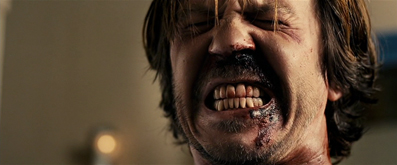
Of course, for many, the relentlessly punishing nature of the drama will make any underlying symbolism impossible to appreciate or even accept, at least while it's playing out, but the idea that one effectively nullifies the other ignores our capacity for post-conflict analysis. It's only right that we should react emotionally to the drama, to recoil at the imagery and the events that unfold, but curiosity alone should prompt us to look for meaning to what we have just witnessed. When you're being repeatedly hit it may only be the force of the blows that register, but afterwards you'll soon find yourself questioning why the assault took place – even the attacks on the World Trade Centre are a testament to this, as horrified onlookers asked themselves out loud, "Why do they hate us?" This need to rationalise, to make sense of the seemingly incomprehensible and apply order to chaos, is key aspect of our capacity to reason and comprehend the world in which we precariously live. For all its horror and taboo busting, nothing in A Serbian Film feels arbitrary or staged purely for the shock of the reaction.
Despite my enthusiasm for A Serbian Film's dramatic punch and metaphoric meat, it remains a tough one to recommend, even to friends with whom I share viewing kinship. That it's going to be a rough ride is built into the publicity, and like Michael Haneke's Funny Games before it, its pre-release reputation should be enough to keep those who would be traumatised by its content from even approaching the DVD, while its effect on those who do choose to watch it will depend partly on their previous viewing experience. For me at least, its piling of horror onto horror is less emotionally punishing than the more harrowingly realistic misfortunes suffered by the title character in Lukas Moodysson's 2002 Lilya 4-Ever, and I sincerely doubt that it will prove a more consistently gruelling experience than Pasolini's Salò, or the 120 Days of Sodom must have seemed back in 1975 (and remains to the day if the truth be told). Spasojevic himself claims that he only accepted the horror film label because of the impact it has on the average audience and prefers to describe it as "an emotional family drama that goes to hell at one point." But while the 'waking from drugs to find yourself implicated in crime' plot device is the stuff of classic noir, the film's second half bears a structural kinship to the 1992 Candyman, whose bloodied lead protagonist wakes with no memory of the appalling act she has supposedly committed, the first step on a downward spiral of unbroken horrors that destroy those closest to her and drag her steadily towards her own death. And as a horror movie, Spasojevic's film certainly delivers, in the violence of is visceral elements and the Faustian descent into dark and forbidden places that offer little hope of redemption or escape. This does sometimes bring the surface in conflict with the subtext, resulting in a climactic shock revelation for Milos that the audience will see coming from the moment he is led naked into what Vukmir cheerily describes as "a warm family home."
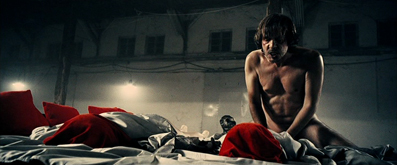
Reaction to the film has been unsurprisingly diverse and understandably extreme, with Ain't It Cool's Harry Knowles selecting it as one of his ten best of the year, and The Guardian's Peter Bradshaw dismissing it with the claim that "the acting and direction are awful." They're not – far from it. Whatever issues you might have with A Serbian Film, it's strikingly well made, with pristine scope cinematography by Nemanja Jovanov, and the sort of relentlessly sinister soundtrack (kudos here to composer Sky Wikluh and sound designer Aleksandar Protic) that loads even pictorially innocent sequences with potential threat. It's an aspect celebrated by Dejan Ognjanovic in his review for Quiet Earth, where he says of the film, "the most shocking thing about it is how well made, well acted and poignant it is." One of the most intriguing reactions came from Dog Soldiers and The Descent director Neil Marshall when discussing the appeal of poor quality VHS copies of once-banned horror films in Jake West's excellent documentary, Video Nasties– Moral Panic, Censorship and Videotape. As a long-standing horror fan he was actually disappointed by the film's technical polish: "The problem with that is that it's beautifully made – the photography's top notch, everything's crystal clean, so no matter how appalling the subject matter, you know it's a movie, and you know that it's been faked, and the effects are there to see. And it takes away that grubby nastiness that we had with dodgy VHS films."
Of course, to read symbolic meaning into every character and action would involve over-analysing elements that were designed purely to advance the narrative. The opening sequence alone offers opportunities aplenty, in the image of young Petar watching a hardcore movie starring his own father, in his mother Marija's annoyance that the disc has been left lying within her son's reach, in Milos's unconcerned claim that he watched his first porn movie at the same young age, in Marija's description for Petar's benefit of porno as "cartoons for grown ups." The climactic confrontation is similarly peppered with possible double meanings, in the penetrative symbolism of the gun Milos uses to kill (whole essays have been written on the phallic nature of Dirty Harry's famed Magnum .44, which even made its way into the dialogue of The Enforcer, and penetration is certainly a key element here) and the castration potential of the knife furiously brandished by a bloodied and abused Marija. The problem with this subtextual aspect, at least for a non-Serbian audience, is that Spasojevic has spread his targets rather wide, making it uncertain at times whether he's addressing the rampant exploitation of modern society, his own country's history, or the affects of either on the family unit, though it seems likely that in his eyes all three are intrinsically linked.
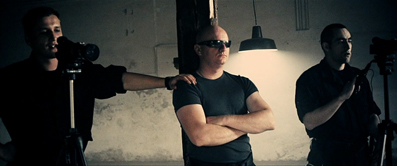
But for many the price of exploring A Serbian Film in such terms will be simply too high, and even a brief description of the content has been enough to convince almost everyone I know to give it a wide berth. For a good many of those who have sat through it, any retrospective deconstruction is effectively moot, requiring as it does the re-examination of imagery they will likely be doing their damndest to expunge. But for those strong-stomached souls willing to dig beneath the surface and explore Spasojevic's confrontational perspective, there are rich analytical and allegorical pickings, and if the sheer anger and ferocity that drive the film forward prompt even a few to examine the events and the thinking that gave it birth and engage in discussion about the increasingly exploitative nature of the society in which we live, then the film will have done its job. It's not my usual practice to defer to another reviewer – you should, after all, be able to sum up in your own words – but I humbly feel obliged to do so here and refer you again to Dejan Ognjanovic's excellent Quiet Earth review (you can read the whole thing here), which nails the film's metaphoric power in a single concise sentence: "Instead of copy-pasting reality, A Serbian Film offers a stylized version of what it feels like to live in country humiliated, denigrated, impoverished, bombed-out, stripped of its territory, labeled genocidal and haunted by the spirits of war crimes both real and constructed." Hell, that works for me.
As you are probably aware, A Serbian Film was subjected to 4 minutes 11 seconds of cuts by the BBFC in order to secure a UK cinema release, with a further one second lopped for the DVD. The BBFC's web site quotes the reasons as follows:
Cuts required to remove portrayals of children in a sexualised or abusive context and images of sexual and sexualised violence which have a tendency to eroticise or endorse the behaviour.
I'm sure a good many of you out there would actually support the decision based on that wording, and while I fully understand where the BBFC are coming from, I'd question the suggestion that the film in any way eroticises or endorses the behaviour that the board felt compelled to censor. All of the cuts made are trims to scenes that remain in the film, with no entire sequences removed or drastically altered in tone. In some cases this may seem to do the scene in question no major harm, but it still impacts on the director's intentions. The rape/beheading sequence may be slightly less protracted here but is still appropriately horrific, but the removal of the shots in which the frenzied Milos has to be dragged from the body does weaken the subtext. And as Michael Brooke points out in his Sight & Sound review, the elimination of shots the artificial newborn allow our imagination to fill the gap with something more realistic, which paradoxically makes the sequence more disturbing in its censored form.
There are also cuts here that make little sense in the context of the above stated justification, in particular the sequence in which Milos's brother Marko, himself a symbol of police/state corruption, is being fellated whilst watching his brother's home videos, where the object of his fantasy is not the young Petar but Milos's wife Marija, hardly taboo territory. There's even a sense that the film has been singled out for censorship in areas where other films have been passed uncut. A dream sequence in which Milos appears naked in the same frame as his watching son has been removed, despite the fact that the two actors were filmed separately and composited in post production, while a shot following a young boy as he walks in on his parents engaged in energetic and quite explicit sex has been left unmolested in Gasper Noé's Enter the Void.
The sort of near-pristine anamorphic 2.35:1 transfer that the above-quoted Neil Marshall would doubtless be disappointed by – the detail is excellent for DVD (though a few scenes to feel just a tad enhanced) and the contrast well balanced even in darker scenes, of which there are many. Detail is rarely sacrificed to nail the black levels, which are essential to the look and tone of a few key scenes. As is the way with modern cinema, the image has been considerably tweaked in post-production, draining the film of any hint of strong colour and adding earthy or cold hues to scenes, depending on their location, content and tone. The slightly steely look is partly the result of shooting on the Red One HD camera, which is becoming something of a favourite with modern feature directors.
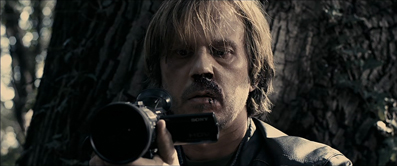
The choice between Dolby stereo 2.0 and 5.1 surround will come down to personal preference – sonically they are on similar ground, though the 5.1 favours the centre ground more than the stereo. Directional effects are rare and there's little if anything happening at the rear on the surround track. Clarity is fine throughout and the music packs a pleasingly unsettling punch. The English subtitles are fixed in place.
Introduction (3:50)
The film itself is preceded by an introduction by director Srdjan Spasojevic, who gives a useful outline of his intentions and the reasons for the film's confrontational nature, staging the whole thing as an interview so we'll take him more seriously. It also has a gag conclusion in which Spasojevic is cut off before he can deliver an key message about the film.
Filmmaker's Insight (9:38)
A post-screening Q&A hosted by genre writer Alan Jones in which director Srdjan Spasojevic and producer Nikola Pantelic (well, mainly Spasojevic) talk about the BBFC cuts, the actors, how the film was financed, the thinking behind its allegorical element, and the role of the family at the story's centre. Jones chips in on the BBFC cuts, revealing that before the planned FrightFest screening (which never took place due to Westminster council's refusal to allow a screening of the uncut version) they showed the film to a lawyer, who assured them that it contained nothing that could be ruled obscene under UK law.
As someone who was captivated by A Serbian Film, I've been nonetheless cautious about recommending it to others, all too aware of the hostile reactions it can prompt and the friendships it could damage. For most it will and perhaps should remain a no-go area and will likely offend even a number of those who believe they are ready for anything extreme cinema can throw at them – Tim Anderson over at dedicated horror site bloody-disgusting.com claimed that watching the film was like having his soul raped and told his readers: "You don't want to see A Serbian Film. You just think you do." I've seen it three times now, and maybe it's my own long standing exposure to extreme cinema that protected me from the effect that it has clearly had on others – I wasn't seriously shocked, but completely understand how others would be and would suggest that anyone who dismissively claims that they don't know what all the fuss is about is doing so purely out of intellectual macho. The film continues to divide audiences and provoke passionate reactions, but now that the initial fuss has died down a little, a surprising number of commentators have been both vocal and eloquent in their support of the film and Spasojevic's intentions. Whether they (or perhaps that should be we) are right or wrong will be in the tolerance of the beholder, and whatever you're viewing experience I'd still advise approaching this one with extreme caution. And I do mean extreme.
With its crisp picture and clear stereo sound (even the 5.1 track isn't actually surround), the DVD at least allows you to appreciate the film's technical achievements, and if you're a glutton for that extra sharpness then you can even buy it on Blu-ray (mine's on order). The intro and Q&A are both useful extras, but I can't help but feel that the opportunity to really get behind the thinking and making of the film, and even the reaction to it, has been missed.
* This is no abstract symbolism – if you're planning to take part in the 26th March rally against the government cutbacks (and you should), then keep an eye on the doubtless substantial police presence and you'll see a number of similarly dressed figures with their camcorders trained on you and your fellow protestors with an eye on future prosecution should events take a confrontational turn.
** You may marvel at the sheer number of apps you can get for that iPhone you splashed out so much for, but you only get to install those that the multi-national conglomerate that made the device approves of. You've paid for it, you own it, but it essentially remains the property of the manufacturer's prim morality. Little wonder, then, that bypassing this restriction has become known as 'jail-breaking'.
*** http://www.newint.org/features/1993/06/05/rape/
|